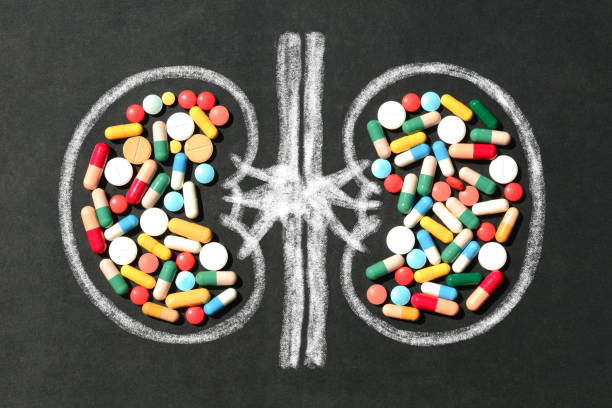A kidney infection, also known as pyelonephritis, is a serious and potentially life-threatening condition that arises when bacteria or viruses infect one or both kidneys. This type of infection often starts in the lower urinary tract, specifically the bladder or urethra, and travels up to the kidneys. Kidney infections require prompt medical attention to prevent complications such as kidney damage or the spread of the infection to the bloodstream, which can result in sepsis.
Kidney infections are more common in women than men due to anatomical differences, such as the shorter length of the female urethra, which makes it easier for bacteria to reach the bladder and subsequently the kidneys. Other risk factors include a history of urinary tract infections (UTIs), kidney stones, structural abnormalities of the urinary tract, a weakened immune system, and certain medical conditions like diabetes.
Understanding the causes, symptoms, and treatment options for kidney infections is essential for preventing and managing this condition. This introduction provides a comprehensive overview of kidney infections, emphasizing the importance of prompt medical intervention and preventive measures to safeguard kidney health.
Table of Contents
Symptoms of Kidney Infection

A kidney infection, or pyelonephritis, can cause a range of symptoms that vary in severity. Recognizing these symptoms early is crucial for prompt diagnosis and treatment, which can prevent complications and promote recovery. Here are the common symptoms associated with a kidney infection:
1. General Symptoms
- Fever: High fever is a common symptom, often accompanied by chills and shaking.
- Fatigue: General feelings of tiredness and malaise are frequent.
2. Pain
- Back or Side Pain: Pain in the back, side (flank), or groin is typical. The pain may be severe and localized to the area around the affected kidney.
- Abdominal Pain: Some people may experience lower abdominal pain.
3. Urinary Symptoms
- Frequent Urination: A frequent urge to urinate, often producing only small amounts of urine.
- Painful Urination: Burning or pain during urination (dysuria).
- Urgency: A sudden, strong need to urinate.
- Hematuria: Blood in the urine, causing it to appear pink, red, or brown.
- Cloudy or Foul-Smelling Urine: Changes in the appearance and smell of urine.
4. Gastrointestinal Symptoms
- Nausea: A feeling of nausea is common.
- Vomiting: Some individuals may experience vomiting, which can exacerbate dehydration and weakness.
5. Systemic Symptoms
- Sweating: Excessive sweating, particularly night sweats.
- Confusion: In severe cases, especially in older adults, confusion or changes in mental status may occur.
6. Localized Tenderness
- Tenderness in the Kidney Area: The area around the lower back and sides may be tender to the touch.
Kidney infections present with a variety of symptoms, including fever, pain, urinary issues, and gastrointestinal disturbances. Recognizing these symptoms early and seeking medical care promptly is crucial for effective treatment and preventing complications. If you suspect you have a kidney infection, contact a healthcare provider immediately to ensure proper diagnosis and management.
Causes of Kidney Infection

A kidney infection, or pyelonephritis, typically occurs when bacteria or, in rare cases, viruses infect the kidneys. Understanding the causes of kidney infections can help in prevention, early detection, and effective treatment. Here are the primary causes of kidney infections:
1. Bacterial Infection
Ascending Infection
- Urinary Tract Infections (UTIs): The most common cause of kidney infections is bacteria entering the urinary tract through the urethra and multiplying in the bladder. The infection can then travel up the ureters to the kidneys. Escherichia coli (E. coli), a type of bacteria commonly found in the intestines, is the most frequent culprit.
- Sexual Activity: Sexual intercourse can introduce bacteria into the urinary tract, increasing the risk of UTIs and subsequent kidney infections, particularly in women.
Hematogenous Spread
- Bloodstream Infections: In some cases, bacteria from an infection elsewhere in the body can spread through the bloodstream to the kidneys. This route is less common but can occur with severe infections like bacterial endocarditis.
2. Structural Abnormalities of the Urinary Tract
- Vesicoureteral Reflux (VUR): A condition where urine flows backward from the bladder into the ureters and sometimes the kidneys. This reflux can carry bacteria into the kidneys, leading to infection.
- Kidney Stones: Stones can obstruct the flow of urine, creating an environment where bacteria can grow and cause infection.
- Congenital Abnormalities: Structural abnormalities present from birth can disrupt normal urine flow and increase the risk of infections.
3. Catheter Use
- Urinary Catheters: The use of urinary catheters can introduce bacteria into the urinary tract, especially if the catheter is in place for an extended period. This is a common cause of kidney infections in hospitalized patients or those with chronic medical conditions requiring catheter use.
4. Weakened Immune System
- Immunosuppressive Medications: Individuals taking medications that suppress the immune system, such as those used in autoimmune diseases or after organ transplantation, are at higher risk for infections, including kidney infections.
- Chronic Diseases: Conditions such as diabetes can weaken the immune system and make individuals more susceptible to infections.
5. Female Anatomy
- Shorter Urethra: Women have a shorter urethra than men, which makes it easier for bacteria to reach the bladder and ascend to the kidneys.
- Proximity to Anus: The female urethra is closer to the anus, which increases the likelihood of bacteria from the gastrointestinal tract entering the urinary tract.
6. Recent Urinary Tract Surgery or Procedures
- Surgical Interventions: Procedures involving the urinary tract, such as cystoscopy or surgery, can introduce bacteria and increase the risk of infections.
7. Pregnancy
- Hormonal Changes: Hormonal changes during pregnancy can affect the urinary tract, making it easier for bacteria to travel to the kidneys.
- Pressure on Urinary Tract: The growing uterus can exert pressure on the bladder and ureters, leading to incomplete emptying of the bladder and increased risk of infection.
Risk Factors for Kidney Infection
Kidney infections, or pyelonephritis, can affect anyone, but certain factors can increase the risk of developing this condition. Understanding these risk factors can help in identifying individuals at higher risk and taking preventive measures. Here are the key risk factors for kidney infections:
1. Female Anatomy
- Shorter Urethra: Women have a shorter urethra than men, which makes it easier for bacteria to reach the bladder and ascend to the kidneys.
- Proximity to Anus: The female urethra is closer to the anus, increasing the likelihood of bacteria from the gastrointestinal tract entering the urinary tract.
2. Sexual Activity
- Increased Risk of UTIs: Sexual intercourse can introduce bacteria into the urinary tract, particularly in women, increasing the risk of urinary tract infections (UTIs) that can lead to kidney infections.
3. Urinary Tract Abnormalities
- Vesicoureteral Reflux (VUR): A condition where urine flows backward from the bladder into the ureters and kidneys, increasing the risk of kidney infections.
- Kidney Stones: Stones can obstruct urine flow, creating an environment where bacteria can grow and cause infections.
- Congenital Abnormalities: Structural abnormalities present from birth can disrupt normal urine flow and increase the risk of infections.
4. Urinary Catheters
- Catheter Use: The use of urinary catheters, especially for extended periods, can introduce bacteria into the urinary tract, increasing the risk of infections.
5. Weakened Immune System
- Immunosuppressive Medications: Individuals taking medications that suppress the immune system, such as those used in autoimmune diseases or post-organ transplantation, are at higher risk for infections.
- Chronic Diseases: Conditions like diabetes can weaken the immune system and make individuals more susceptible to infections.
6. Pregnancy
- Hormonal Changes: Hormonal changes during pregnancy can affect the urinary tract, making it easier for bacteria to travel to the kidneys.
- Pressure on Urinary Tract: The growing uterus can exert pressure on the bladder and ureters, leading to incomplete emptying of the bladder and increased risk of infection.
7. History of Urinary Tract Infections (UTIs)
- Recurrent UTIs: Individuals with a history of recurrent UTIs are at a higher risk of developing kidney infections, as the infection can spread from the bladder to the kidneys.
8. Blockages in the Urinary Tract
- Obstructions: Any blockage that disrupts the normal flow of urine, such as an enlarged prostate in men, can increase the risk of kidney infections.
9. Recent Urinary Tract Surgery or Procedures
- Surgical Interventions: Procedures involving the urinary tract, such as cystoscopy or surgery, can introduce bacteria and increase the risk of infections.
10. Age
- Older Adults: Older adults are at higher risk for kidney infections due to factors such as weakened immune systems, increased likelihood of catheter use, and higher incidence of chronic conditions.
11. Genetic Predisposition
- Family History: A family history of urinary tract infections or kidney problems can increase an individual’s risk of developing kidney infections.
Diagnosis of Kidney Infection

Diagnosing a kidney infection, or pyelonephritis, involves a combination of medical history, physical examination, and diagnostic tests. Early and accurate diagnosis is crucial for effective treatment and preventing complications. Here are the primary steps involved in diagnosing a kidney infection:
1. Medical History
- Symptom Inquiry: The healthcare provider will ask about the patient’s symptoms, including fever, back or side pain, frequent or painful urination, nausea, and any changes in urine appearance.
- History of UTIs: Information about any previous urinary tract infections (UTIs) and their treatments.
- Medical Conditions: Inquiry about underlying medical conditions such as diabetes, kidney stones, or structural abnormalities of the urinary tract.
- Recent Medical Procedures: Information about any recent procedures involving the urinary tract, such as catheter use or surgeries.
2. Physical Examination
- Vital Signs: Checking for signs of infection, such as fever and elevated heart rate.
- Abdominal and Flank Examination: Palpation of the abdomen and back to check for tenderness, particularly in the area over the kidneys (flank tenderness).
- General Assessment: Evaluating the overall health and hydration status of the patient.
3. Laboratory Tests
Urinalysis
- Purpose: To detect the presence of bacteria, white blood cells (indicating infection), red blood cells, and other abnormalities in the urine.
- Procedure: A sample of urine is collected and analyzed for signs of infection.
Urine Culture
- Purpose: To identify the specific type of bacteria causing the infection and determine the most effective antibiotic treatment.
- Procedure: A urine sample is cultured in a lab to grow and identify bacteria. This process usually takes 24 to 48 hours.
Blood Tests
- Complete Blood Count (CBC): To check for signs of infection, such as elevated white blood cell count.
- Blood Culture: In cases of severe infection, a blood culture may be performed to check if the infection has spread to the bloodstream (bacteremia).
4. Imaging Tests
Ultrasound
- Purpose: To detect any structural abnormalities, obstructions, kidney stones, or abscesses in the kidneys.
- Procedure: A non-invasive imaging test that uses sound waves to create images of the kidneys.
CT Scan (Computed Tomography)
- Purpose: To provide detailed images of the kidneys and surrounding structures, especially useful in complicated or severe cases.
- Procedure: A more detailed imaging test that uses X-rays and computer technology to create cross-sectional images of the body.
MRI (Magnetic Resonance Imaging)
- Purpose: To provide detailed images of the kidneys and urinary tract without using radiation.
- Procedure: An imaging test that uses magnetic fields and radio waves to create detailed images of the kidneys.
5. Specialized Tests
Voiding Cystourethrogram (VCUG)
- Purpose: To assess for vesicoureteral reflux (VUR), a condition where urine flows backward from the bladder to the kidneys.
- Procedure: A contrast dye is introduced into the bladder through a catheter, and X-rays are taken while the patient urinates to visualize the urinary tract.
DMSA Scan (Dimercaptosuccinic Acid Scan)
- Purpose: To assess kidney function and detect any scarring or damage from repeated infections.
- Procedure: A small amount of radioactive material is injected into the bloodstream, and images of the kidneys are taken with a special camera.
Treatment of Kidney Infection

Treatment for a kidney infection, or pyelonephritis, typically involves antibiotics to eliminate the infection and supportive care to manage symptoms. The severity of the infection and the patient’s overall health will determine the specific treatment approach. Here are the primary treatment options for kidney infections:
1. Antibiotic Therapy
Oral Antibiotics
- Initial Treatment: For mild to moderate kidney infections, oral antibiotics are usually the first line of treatment.
- Common Antibiotics: Ciprofloxacin, levofloxacin, trimethoprim-sulfamethoxazole (Bactrim), amoxicillin-clavulanate (Augmentin).
- Duration: Typically prescribed for 7 to 14 days, depending on the severity of the infection and the patient’s response to treatment.
- Follow-Up: A follow-up urine culture may be performed to ensure the infection has been eradicated.
Intravenous (IV) Antibiotics
- Severe Infections: For severe kidney infections or patients unable to take oral antibiotics, hospitalization and IV antibiotics may be necessary.
- Common IV Antibiotics: Ceftriaxone, cefotaxime, gentamicin, piperacillin-tazobactam.
- Duration: IV antibiotics are usually administered for a few days until symptoms improve, followed by a course of oral antibiotics.
2. Supportive Care
Pain and Fever Management
- Pain Relievers: Over-the-counter pain relievers such as acetaminophen (Tylenol) or ibuprofen (Advil, Motrin) to manage pain and reduce fever.
- Hydration: Drinking plenty of fluids to help flush bacteria from the urinary tract and prevent dehydration.
3. Hospitalization
Indications for Hospitalization
- Severe Symptoms: High fever, severe pain, inability to keep fluids down, or signs of sepsis.
- Complications: Abscess formation, severe infection, or kidney failure.
- Underlying Health Conditions: Patients with diabetes, immunocompromised status, or other chronic health conditions.
Hospital Care
- IV Antibiotics and Fluids: Administration of antibiotics and fluids intravenously to ensure adequate hydration and effective treatment.
- Monitoring: Close monitoring of vital signs, kidney function, and response to treatment.
4. Surgical Intervention
Drainage of Abscesses
- Indication: If an abscess forms in the kidney, surgical drainage may be necessary.
- Procedure: A small incision or needle aspiration guided by imaging techniques to drain the abscess.
Addressing Structural Abnormalities
- Indication: Persistent infections due to structural abnormalities such as kidney stones, vesicoureteral reflux, or urinary tract obstructions.
- Procedures: Surgery to remove or correct the underlying abnormality, such as lithotripsy for kidney stones or corrective surgery for reflux.
5. Preventive Measures Post-Treatment
Regular Follow-Up
- Medical Check-Ups: Regular follow-up appointments with a healthcare provider to monitor kidney function and ensure the infection has not recurred.
- Urine Tests: Periodic urinalysis and urine cultures to check for recurrent infections.
Lifestyle Changes
- Hydration: Drinking plenty of fluids to maintain good urinary health.
- Hygiene Practices: Practicing good hygiene, such as wiping from front to back, to prevent bacteria from entering the urinary tract.
- Urination Habits: Urinating frequently and completely to flush out bacteria, and urinating soon after sexual intercourse to clear bacteria from the urethra.
Managing Underlying Conditions
- Chronic Conditions: Managing underlying health conditions such as diabetes to reduce the risk of recurrent infections.
- Medications: Taking any prescribed medications as directed to manage chronic health issues that may predispose to infections.
Prevention of Kidney Infection

Preventing kidney infections involves adopting good urinary hygiene practices, managing underlying health conditions, and making lifestyle changes to reduce the risk of infections. Here are key strategies to help prevent kidney infections:
1. Maintain Good Urinary Hygiene
Hydration
- Drink Plenty of Fluids: Staying well-hydrated helps flush bacteria from the urinary tract. Aim for at least 8 glasses of water a day, or more if advised by your healthcare provider.
Bladder Habits
- Frequent Urination: Urinate regularly and do not hold in urine for extended periods. This helps prevent the buildup of bacteria in the bladder.
- Complete Emptying: Make sure to empty your bladder completely when urinating to ensure all bacteria are flushed out.
Post-Intercourse Hygiene
- Urinate After Sex: Urinating soon after sexual intercourse helps clear bacteria from the urethra, reducing the risk of urinary tract infections (UTIs) that can lead to kidney infections.
- Clean Genital Area: Maintain good hygiene by gently cleaning the genital area before and after sex.
2. Practice Proper Personal Hygiene
- Wipe Correctly: Women should wipe from front to back after using the toilet to prevent bacteria from the anus from entering the urethra.
- Gentle Cleansing: Use mild, unscented soap and water to clean the genital area. Avoid harsh soaps, douches, and feminine hygiene sprays that can irritate the urethra.
3. Avoid Potential Irritants
- Caffeine and Alcohol: Limit the intake of caffeine and alcohol, which can irritate the bladder and increase the risk of infection.
- Scented Products: Avoid using scented feminine hygiene products, bubble baths, and sprays in the genital area.
4. Manage Underlying Health Conditions
- Diabetes: Keep blood sugar levels under control if you have diabetes, as high blood sugar can increase the risk of infections.
- Kidney Stones: Follow your healthcare provider’s advice for managing kidney stones, which can block the flow of urine and create an environment for bacteria to grow.
- Urinary Tract Abnormalities: Work with your healthcare provider to manage any structural abnormalities in the urinary tract that may predispose you to infections.
5. Use Antibiotics Appropriately
- Complete the Course: If prescribed antibiotics for a UTI, complete the entire course to ensure the infection is fully treated and to prevent the development of antibiotic-resistant bacteria.
- Prophylactic Antibiotics: In some cases, your healthcare provider may recommend low-dose antibiotics for a period of time to prevent recurrent infections.
6. Regular Medical Check-Ups
- Routine Urine Tests: Periodic urinalysis can help detect early signs of infection, especially if you are at higher risk due to underlying conditions.
- Follow-Up Appointments: Regular check-ups with your healthcare provider can help manage chronic conditions and monitor your urinary health.
7. Lifestyle Changes
- Healthy Diet: Eat a balanced diet rich in fruits, vegetables, lean proteins, and whole grains to support overall health and immune function.
- Exercise Regularly: Engage in regular physical activity to maintain good health and boost your immune system.
- Quit Smoking: If you smoke, seek help to quit. Smoking can weaken the immune system and increase the risk of infections.
8. Preventive Measures for High-Risk Individuals
- Immunocompromised Individuals: If you have a weakened immune system, take extra precautions to avoid infections and work closely with your healthcare provider to manage your health.
- Pregnant Women: Pregnant women should attend all prenatal visits and follow their healthcare provider’s advice to reduce the risk of UTIs and kidney infections during pregnancy.
Complications of Kidney Infection
Kidney infections, also known as pyelonephritis, can lead to serious health complications if not treated promptly and effectively. Understanding these potential complications is important for recognizing the severity of the condition and the necessity of timely medical intervention. Here are some of the key complications associated with kidney infections:
1. Chronic Kidney Disease (CKD)
Description:
- Permanent Damage: Repeated or severe kidney infections can cause lasting damage to the kidneys, leading to chronic kidney disease.
- Impaired Function: Chronic kidney disease involves a gradual loss of kidney function over time, which can lead to kidney failure if not managed properly.
Symptoms:
- Fatigue: Persistent tiredness and lack of energy.
- Swelling: Edema in the legs, ankles, or feet due to fluid retention.
- High Blood Pressure: Elevated blood pressure as the kidneys struggle to regulate fluid and electrolyte balance.
2. Kidney Abscess
Description:
- Pus Formation: An abscess is a collection of pus that forms within or around the kidney as a result of severe infection.
- Infection Spread: The abscess can cause further infection and damage if it ruptures or spreads.
Symptoms:
- Severe Pain: Intense pain in the back or side.
- High Fever: Persistent high fever and chills.
- Nausea and Vomiting: Ongoing nausea and vomiting.
3. Sepsis
Description:
- Systemic Infection: Sepsis is a life-threatening condition that occurs when the infection spreads into the bloodstream, causing a systemic inflammatory response.
- Organ Failure: Sepsis can lead to multi-organ failure and requires immediate medical intervention.
Symptoms:
- High Fever: Very high fever or a significant drop in body temperature.
- Rapid Heart Rate: Increased heart rate (tachycardia).
- Rapid Breathing: Increased respiratory rate.
- Confusion: Altered mental state or confusion.
- Low Blood Pressure: Severe drop in blood pressure (septic shock).
4. Kidney Scarring
Description:
- Fibrosis: Recurrent infections can lead to scarring of the kidney tissue, known as fibrosis.
- Reduced Function: Scarred tissue can impair kidney function and lead to chronic kidney disease.
Symptoms:
- Similar to CKD: Symptoms may overlap with those of chronic kidney disease, including fatigue, high blood pressure, and swelling.
5. Acute Kidney Injury (AKI)
Description:
- Sudden Failure: Acute kidney injury is a sudden and severe decrease in kidney function that can occur with severe infections.
- Reversible: AKI can be reversible with prompt treatment but can lead to permanent damage if not managed quickly.
Symptoms:
- Decreased Urine Output: Sudden reduction in the amount of urine produced.
- Swelling: Swelling in the legs, ankles, or feet.
- Fatigue: Extreme tiredness and confusion.
6. Recurrent Urinary Tract Infections (UTIs)
Description:
- Frequent Infections: Individuals who have had a kidney infection are at higher risk for recurrent urinary tract infections.
- Increased Risk: Each subsequent infection can increase the risk of kidney damage.
Symptoms:
- Frequent Urination: Increased frequency and urgency of urination.
- Burning Sensation: Pain or burning during urination.
- Discomfort: Lower abdominal pain and discomfort.
7. Hypertension (High Blood Pressure)
Description:
- Elevated Pressure: Kidney infections can cause or worsen high blood pressure, which in turn can further damage the kidneys.
- Chronic Condition: Persistent high blood pressure can lead to long-term cardiovascular issues.
Symptoms:
- Headaches: Frequent headaches and blurred vision.
- Shortness of Breath: Difficulty breathing with minimal exertion.
- Chest Pain: Pain or discomfort in the chest area.
Living With Kidney Infections
Living with a history of kidney infections, or pyelonephritis, requires careful management and lifestyle adjustments to prevent recurrence and maintain overall kidney health. Here are key strategies and considerations for individuals managing kidney infections:
1. Medical Management
Regular Monitoring
- Follow-Up Appointments: Regular visits to your healthcare provider are essential to monitor kidney function and detect any signs of recurrent infection.
- Urine Tests: Periodic urinalysis and urine cultures can help detect early signs of infection.
Medication Adherence
- Complete Antibiotic Courses: Always complete the full course of prescribed antibiotics to ensure the infection is fully eradicated and to prevent the development of antibiotic-resistant bacteria.
- Prophylactic Antibiotics: In some cases, low-dose antibiotics may be prescribed for a period to prevent recurrent infections.
2. Hydration
- Drink Plenty of Fluids: Staying well-hydrated helps flush bacteria from the urinary tract. Aim to drink at least 8 glasses of water a day, or more if advised by your healthcare provider.
- Cranberry Juice: Some studies suggest that cranberry juice may help prevent urinary tract infections, but it should be consumed in moderation and as part of a balanced diet.
3. Urinary Hygiene
Bladder Habits
- Frequent Urination: Urinate regularly and do not hold in urine for extended periods. This helps prevent the buildup of bacteria in the bladder.
- Complete Emptying: Make sure to empty your bladder completely when urinating to ensure all bacteria are flushed out.
Post-Intercourse Hygiene
- Urinate After Sex: Urinating soon after sexual intercourse helps clear bacteria from the urethra, reducing the risk of urinary tract infections (UTIs) that can lead to kidney infections.
- Clean Genital Area: Maintain good hygiene by gently cleaning the genital area before and after sex.
4. Personal Hygiene
- Wipe Correctly: Women should wipe from front to back after using the toilet to prevent bacteria from the anus from entering the urethra.
- Gentle Cleansing: Use mild, unscented soap and water to clean the genital area. Avoid harsh soaps, douches, and feminine hygiene sprays that can irritate the urethra.
5. Diet and Lifestyle
Healthy Diet
- Balanced Nutrition: Eat a balanced diet rich in fruits, vegetables, lean proteins, and whole grains to support overall health and immune function.
- Limit Irritants: Avoid excessive caffeine and alcohol, which can irritate the bladder.
Regular Exercise
- Stay Active: Engage in regular physical activity to maintain good health and boost your immune system.
- Moderate Exercise: Moderate-intensity exercises like walking, swimming, and cycling are beneficial.
6. Managing Underlying Conditions
- Diabetes: Keep blood sugar levels under control if you have diabetes, as high blood sugar can increase the risk of infections.
- Kidney Stones: Follow your healthcare provider’s advice for managing kidney stones, which can block the flow of urine and create an environment for bacteria to grow.
- Urinary Tract Abnormalities: Work with your healthcare provider to manage any structural abnormalities in the urinary tract that may predispose you to infections.
7. Awareness and Education
- Know the Symptoms: Be aware of the symptoms of kidney infections, such as fever, back or side pain, frequent or painful urination, and changes in urine appearance.
- Early Intervention: Seek medical attention promptly if you experience symptoms of a kidney infection to ensure early diagnosis and treatment.
8. Support Systems
Emotional Support
- Support Groups: Join support groups for individuals with recurrent UTIs or kidney infections to share experiences and gain emotional support.
- Counseling: Consider counseling or therapy to help cope with the stress and anxiety associated with recurrent infections.
9. Preventive Measures
Avoid Catheters
- Limit Catheter Use: Avoid the use of urinary catheters if possible, as they can introduce bacteria into the urinary tract. If catheter use is necessary, follow proper hygiene and care instructions.
Conclusion
Kidney infections, or pyelonephritis, are serious medical conditions that require prompt diagnosis and effective treatment to prevent complications such as chronic kidney disease, kidney abscesses, and sepsis. Recognizing the symptoms early, such as fever, back pain, and changes in urine, and seeking medical attention can ensure timely intervention and reduce the risk of severe outcomes.
Living with a history of kidney infections necessitates ongoing management and lifestyle modifications to prevent recurrence. This includes maintaining good urinary and personal hygiene, staying well-hydrated, adhering to prescribed medications, and regularly monitoring kidney health through follow-up appointments and urine tests. Managing underlying conditions, such as diabetes and kidney stones, is also crucial in reducing the risk of future infections.
By adopting preventive measures, such as drinking plenty of fluids, practicing proper bladder habits, and avoiding potential irritants, individuals can significantly lower their risk of recurrent infections. Additionally, staying informed about the symptoms and risk factors of kidney infections empowers individuals to take proactive steps in safeguarding their kidney health.
Overall, effective management of kidney infections involves a comprehensive approach that combines medical treatment, lifestyle changes, and preventive strategies. With vigilant care and collaboration with healthcare providers, individuals can maintain their kidney health and overall well-being, reducing the likelihood of recurrent infections and their associated complications. If you experience symptoms of a kidney infection, it is essential to seek medical advice promptly to ensure appropriate care and treatment.
